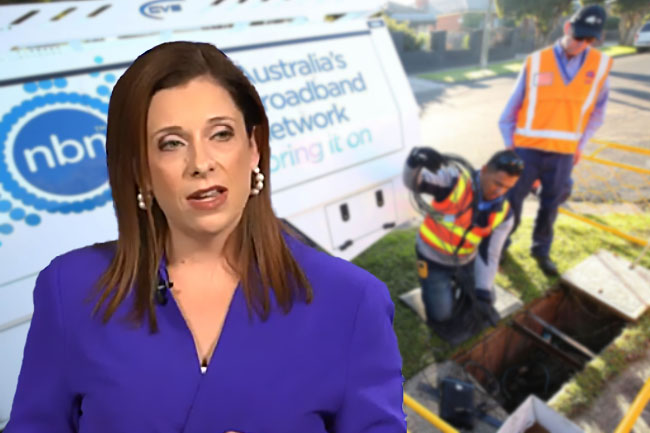Because Australians affected by an increased cost of living are having to shop around for the best price for their broadband services, the NBN is losing out, writes Paul Budde.
THE LATEST Australian Competition & Consumer Commission (ACCC) 'NBN Wholesale Market Indicators Report' shows the top three telcos (Telstra, TPG and Optus) have suffered a slight loss in customers, while smaller internet retailers have increased their customer numbers. Each one of them lost 0.3% market share and the new standings are now: Telstra 43.7%, TPG 23.3% and Optus 13.9%.
The biggest winner of the smaller players is the market's number five player, Aussie Broadband, which increased its market share by 0.5% to 6.1%. Vocus, at number four, stayed at 7.3%.
Mixed reports on broadband competition
While the ACCC is talking this up as a win for competition, I can’t see that this meagre 1% growth for the rest of the industry is anything much to cheer about. If we look at the top five players, they hold 94.3% of the market share, which leaves 5.7% for more than 130 other players in the market.
While the smaller players do have a lower cost base and can therefore be more competitive, in general, the gains for smaller players are basically a result of the crumbs falling off the table of the "big three".
The bigger companies might also, intentionally, be putting little effort into catering to less-profitable sections of the market, leaving customers ripe for the picking by smaller companies.
Price remains the major reason why customers are shopping around. We hear a lot about how much more expensive the cost of living is. Those affected by it will shop around for the best price for their broadband services.
NBN losing customers to mobile operators
On the other side in the report that I discussed in last week's Independent Australia article, NBN Co forecasts that it will lose at least 250,000 customers a year for the next few years to the 4G and 5G operators.
According to that report:
'Based on contemporary market conditions, net churn for FY22 is forecast to be 3.1% or 263,000 customers. In FY23 NBN expects net churn to be higher still at 3.3% or 283,000 customers.'
In the past, NBN Co has complained about this possibility and it wanted the ACCC and/or the government to step in to avoid this from happening. However, the ACCC indicated that it would not do that.
It is another clear indication that the NBN is not delivering the sort of services that customers expect. On the one hand, service quality falls far short of what customers expect and on the other, good quality services offered by NBN Co are not affordable for most Australians.
With the squeeze on margins available to NBN retail service providers, those telcos that do have an option to use mobile services to bypass NBN Co’s stranglehold on the market will use these services wherever they can. If NBN margins were better and if good quality NBN services were more affordable, NBN Co would not have the problem of losing customers to mobile operators.
Increased use of mobile services will furthermore see an increase in the number of households that will go mobile-only. It is estimated that, currently, around 15-20% of households have gone mobile-only. Most of these are single-person households and households with very low demand for internet services (such as Netflix).
Another relief for some people will be the arrival of Low Earth Orbit (LEO) satellites.
Initial results are very promising. The service is providing a superior product to the NBN. While its pricing is higher than the NBN, this service is especially welcomed by people in regional and remote areas who require better-quality broadband services for their profession or business. Those needing the internet to work or study from home are another market segment keen to explore satellite services.
Furthermore to my article from last week, it appears the industry has given up on NBN Co — indicating that the network operator’s response to the wholesale pricing regime is totally unacceptable.
It looks like NBN Co is using its position to drag on the process forever and the industry is saying "enough is enough". Australia's top five retail service providers have written a letter to the ACCC and asked it to intervene and undertake a direct regulatory invention that should result in lower wholesale prices.
I don’t believe that is enough. The core of the problem is that the starting costs of the NBN are too high. The only real solution is Government intervention that will see a write off which would decrease these costs and allow NBN Co to come up with a better pricing regime to reflect the importance of the NBN to Australian society and the economy.
Most importantly, the NBN has to become more affordable to all Australians.
Paul Budde is an Independent Australia columnist and managing director of Paul Budde Consulting, an independent telecommunications research and consultancy organisation. You can follow Paul on Twitter @PaulBudde.
Related Articles
- Labor Government needs to step up and fix our NBN
- NBN Co's Sky Muster is failing to deliver
- Budget avoids new NBN announcements
- Government to fund NBN boost for regional areas
- Government advised to accept 'sunk' NBN costs
 This work is licensed under a Creative Commons Attribution-NonCommercial-NoDerivs 3.0 Australia License
This work is licensed under a Creative Commons Attribution-NonCommercial-NoDerivs 3.0 Australia License
Support independent journalism Subscribe to IA.














